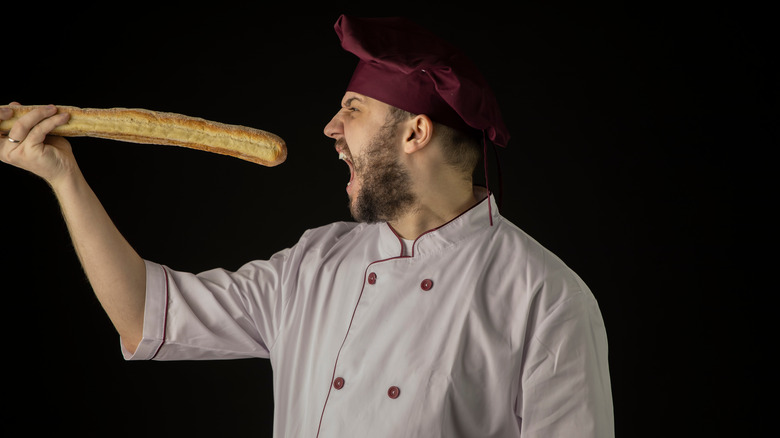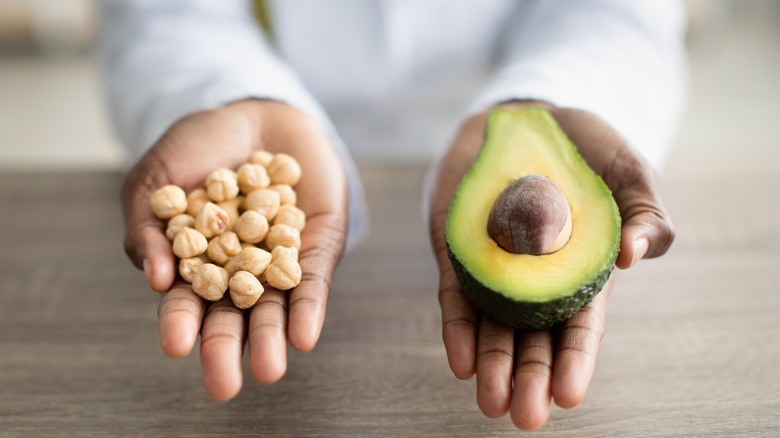Is Carb Withdrawal A Real Thing?
Ahh, pasta. The word even sounds delicious, doesn't it? It's no wonder we love the stuff, crave the stuff, and sometimes feel like we can't live without the stuff. There's a reason we feel this way about foods like pasta, chips, bread, and sweets, and it's not just because they're yummy. According to a 2013 study published in the American Journal of Clinical Nutrition, fast-digesting carbohydrates are able to stimulate regions of the brain associated with cravings and addiction.
Refined grains, starches, corn, and sugar are all considered "fast carbs" because they're rapidly absorbed and converted to glucose in the body (per The New York Times). Our cells crave these fast carbs because they've been tricked into thinking they're getting what they need without having to work as hard. In reality, these highly processed foods cause insulin levels and blood sugar to spike, which ultimately prevents the release of hunger-satiating hormones. When fast carbs become a part of our normal diet, it messes with our metabolism, which can lead to weight gain. Enter: low-carb diets.
Many people have adopted low-carb diets to combat the negative effects of fast carbs. And while limiting these foods can have health benefits, kicking this particular eating habit can feel rough. Is carb withdrawal a real thing — and if it is, how do we get through it?
What does carb withdrawal feel like?
Taking control over your eating habits is a noble cause, but like most good things, it does require some perseverance. Verywell Fit explains that after the first few days of a low-carb diet, some people encounter a set of symptoms often referred to as "low-carb crash" or "keto flu". Harvard Health Publishing asserts that the condition has neither been recognized by the medical community nor substantiated by scientific research, but the phenomenon is widely discussed on the internet in articles, blogs, and online forums.
So while we can't say for certain why keto flu happens, Verywell Fit offers up the theory that it occurs when the body has used up the last of its glucose reserves, which are stored in the liver as glycogen, but has not yet adapted to getting energy from fat and protein.
Healthline explains that while some people kick carbs without any side effects, others have reported symptoms including nausea, headache, diarrhea, dizziness, weakness, muscle cramps or soreness, difficulty sleeping, poor concentration and irritability, and sugar cravings.
How to beat carb withdrawal
If you've recently switched to a low-carb diet and find yourself experiencing carb withdrawal, it's important to remember it won't last forever. Verywell Fit asserts that the symptoms should only last a few days. And while we know you're a tough cookie (no pun intended), you aren't required to muscle through needless suffering. There are a few things you can do that can help ease your discomfort.
Dr. Robert C. Atkins, the creator of the low-carb Atkins Diet, accounted for this particular struggle when designing his eating plan. He recommends consuming 20-25 grams of high-quality, healthy carbs like nuts, seeds, veggies, and cheese each day during the introductory phase (per Everyday Health) While the carbs are strictly limited, fats are fair game! Ensuring that your diet includes enough fat will supply the body with the fuel it needs, while also satiating hunger and quelling those nagging cravings (per Healthline). Other conversations surrounding low-carb crashes have also speculated that the symptoms might be the result of fluid and salt loss (per Verywell Fit). Drinking bone broth a few times a day might offer some relief.



